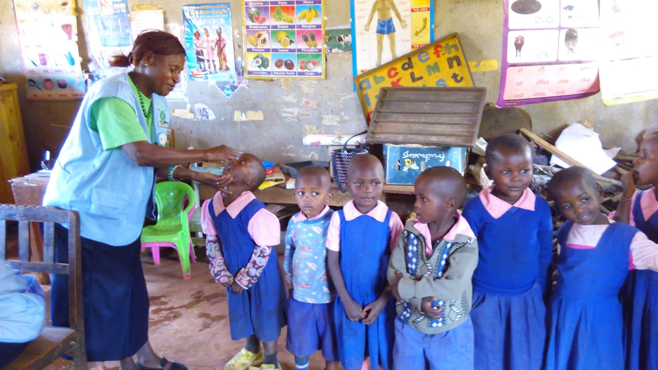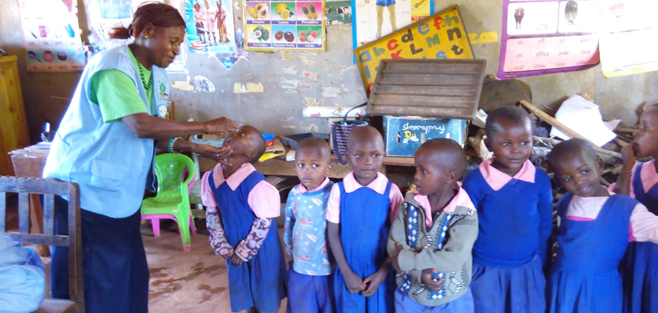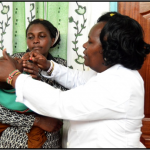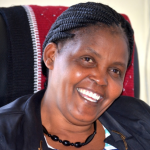Nancy Wambui Kamande is a model citizen of the world. The long-time Early Childhood Education Development (ECDE) teacher is not just content knowing what is right and beneficial to society, she also goes out of her way to take action.
When Nancy first heard of the Scale Up of Vitamin A Supplementation campaign facilitated by Nutrition International and implemented by Centre for Behaviour Change Communication, she became determined to find out as much as she could about it.
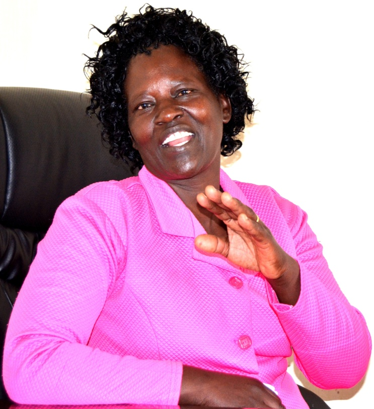
She has since taken action to get the children under her charge at the Mobil ECDE centre in Maragua Ridge, Muranga, to benefit from the Vitamin A Supplementation (VAS) campaign.
“After hearing the Vitamin A news, I thought it important to take the children to the nearest health facility at the earliest opportunity,” she says. “That’s what we did. While other centres sent word for the health workers to visit them, we decided that it was our responsibility as a centre to make sure the children were protected. We didn’t want the health workers to take time organising themselves to visit us. We were not entertaining any excuses. We took the initiative and went to them. The health workers were not only pleased but also very impressed.”
The VAS campaign aims to increase Vitamin A coverage for children of ages 6-59 months in all of Muranga County.The campaign is being implemented through a multi-channel delivery exercise that uses ECDE centres, health facilities, outreaches, and community units to increase the number of children receiving VAS on a regular basis. Nancy has proven to be an asset and a heroine to the campaign. She has worked extremely hard and has made the task of health workers a lot easier.
She is particularly motivated by the children who look forward to going to the facility for their doses of Vitamin A. She believes involving ECDE centres was a terrific idea.
“I think it’s a brilliant idea. The children get excited when they receive Vitamin A together. They cheer one another up and make it almost something to boast about. That way, nobody wants to miss out. Of course the other reason they love it is that it excludes injection. They’ve seen other children being given medicine in the facility, sometimes through injection, and they haven’t liked it. Further, they learn better together. For instance when you ask them what Vitamin A is for, they say such things as that it helps them be strong so they can be leaders in the future. I think involving ECDE centres inspires children and helps them to feel important – they begin to develop an idea of their value to the world. As part of the plan to make them love it still more, the health facility allows them to enter maternity ward where, they are told, children come from. Their eyes pop and they ask tonnes of questions. It’s all adds up to an exciting experience.”
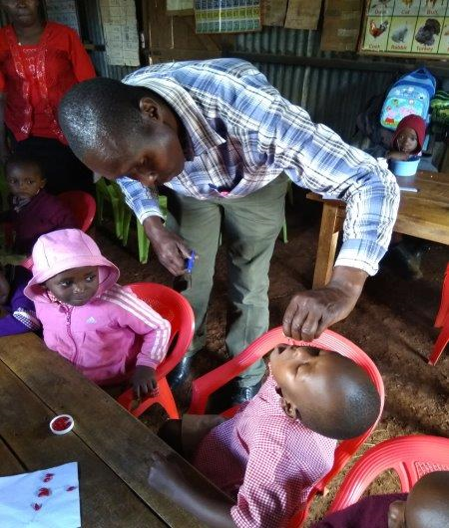
Nancy says VAS has made a huge difference for the children. For instance, they are a lot more active in class and hardly ever absent and because of this her fellow teachers have welcomed and embraced the VAS campaign.
Nancy says that initially parents were concerned and sceptical about the VAS campaign due to some reports on national news reporting that the campaign might involve the use of syringes and injections. “This was the first topic we targeted to set them at ease.” Other parents heard their children talk excitedly about VAS and began to enquire from the centre. “We also have children who either don’t attend school or go to a different school where the campaign has not been so enthusiastically received. The parents approach me and ask if I can include their children the next time Vitamin A is being administered,” Nancy narrates.
The VAS campaign takes a truly emotional turn for Nancy when the role of fathers is brought into the picture; a certain child whose family had broken up was brought by his father to receive Vitamin A.
As Nancy puts it:
“Bringing the children who don’t attend our centre has been a predominantly mothers’ affair. The men have been absent except for the case of one Ugandan. His wife had left him and so he brought the child himself. Though the child did not attend our ECDE centre, a number of children from their neighbourhood did. That’s how the father heard of the campaign. So he came to enquire from me. Out of the blue the child asked me, ‘I don’t have a mother. Can you be my mother?’ It knocked the breath out of me.”
After recollecting her wits, Nancy told the little child that she would be his mother every time he came to school but at home his dad would take care of him. It was a tear-jerking, deeply emotional moment that Nancy says she did not mind.
“As far as I’m concerned, taking care of children in ECDE is a calling,” she says. “I love children. I don’t believe you can do this job unless God himself calls you. Though I had never met a case like this, I take it as part of my job to heal the children not just physically but also emotionally. Before I was officially employed as a children’s worker I volunteered a lot. I used to attend trainings, seminars, and conferences and my husband understood and supported me. He’d remain at home with the children when they were still young while I went for the trainings that sometimes lasted two weeks. When it is a call, you don’t mind that a child has peed or pooped on himself. You get down making the child comfortable.”
Nancy credits her husband for the ease with which she does her job. “He sees me working hard for other people’s children and he is comfortable, understanding that this is a call.”
